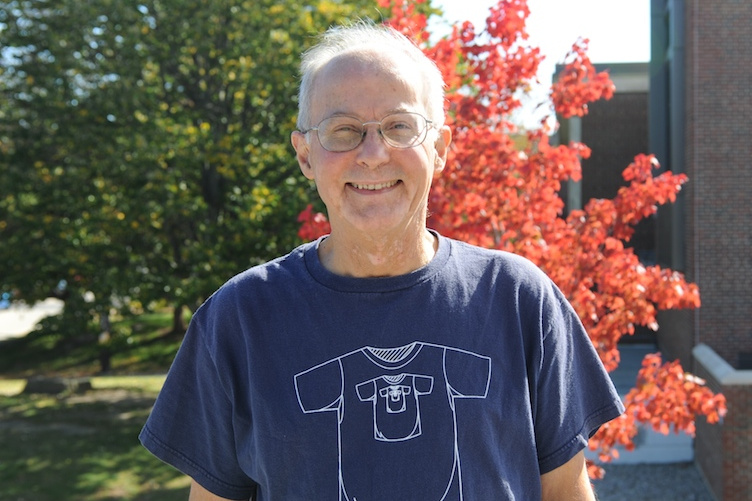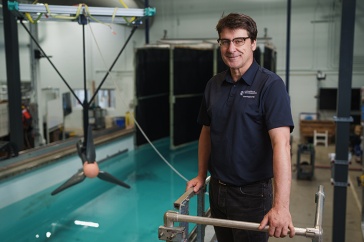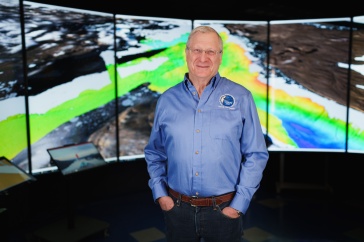
Dan Bergeron, professor emeritus of computer science
Dan Bergeron was the first tenure-track professor of computer science at UNH. When he was hired in 1974, approval for the degree program was still three years away. Back then, students who were interested in the field majored in math with a computer science option. Some computer classes were offered through the electrical engineering department as well.
None of that was different from what Bergeron, professor emeritus of computer science, had encountered 10 years earlier as an undergraduate at Brown University.
“My first experience with computers in 1964 was essentially the same as what most new programmers had for the next 10 to 15 years,” Bergeron says. “The advent of the time-sharing systems in the mid-1970s signaled the first big change in how we taught programming and what the students experienced in that process.”
Programs were created using cards and a keypunch machine similar to a typewriter. Each keystroke produced a set of holes in a column of the card, and each card was a line of the program. One mismarked line could mean having to run the whole program again.
“If you were lucky, you could get two chances each day to run your program, so you had to be really careful that you made the best of your few chances,” Bergeron says. “We would write the program on a piece of paper, carefully hand execute it to see if it was correct and then punch each card. Then, you needed to very carefully match each card to the line on your handwritten paper to make sure you had typed it correctly.”
In 1974, the university had only one main computer and shared it with faculty. “UNH was not really behind the times,” Bergeron says. “That was still the standard for most universities and colleges at the time.”

Radim Bartos, associate professor and chair of computer science
The first UNH students to obtain bachelor's degrees in computer science graduated in December 1977. There were four of them. The formal spilt from the math department came in 1981, when computer science became its own department.
Radim Bartos, associate professor and chair of the computer science department, joined the UNH faculty 20 years ago, when, he says, big changes had already happened in the field. Gone was the reliance on one computer; students had their own desktop computers; some had laptops. HTML, or HyperText Markup Language, had been developed. Use of the internet was exploding.
What’s changed, and continues to change on a seemingly daily basis, is that today’s computers are a lot more powerful and a lot more prevalent, Bartos says, something most people would not have predicted.
“I don’t think we are surprised by what computers can do today, but I don’t think anyone could have imagined how prevalent they are and how inexpensive. We could have imagined being able to stream data in high definition,” he says. “I don’t know that we could have imagined streaming it to mobile devices in everyone’s pocket.”
The speed at which development happens today is another significant change. Tasks that once took months can now be done in days or a few weeks, at most.
“The process is so much faster,” Bartos says. “The focus isn’t just what can we do, but what services can we deliver and how quickly can we deliver them. The biggest challenge now is how to go forward. It’s hard to think of an area where technology shouldn’t go, so it seems whatever the way forward, we should be mindful of broader implications. We need to educate people in ethics. How the field of computer science navigates privacy, for example, is a significant issue.”
Computer science majors are still seeking the same or similar kinds of jobs they were in 1974, becoming software developers, systems analysts, systems developers, game developers, web designers and, with UNH’s addition of an information technology (IT) major, IT consultants or IT security specialists.
“The biggest thing I try to teach students is how to learn to focus,” Bergeron says. “When they leave here, they will still be learning every day. Changes are happening so rapidly; they have to practice. It’s like wanting to be a musician. You have to learn how to make the notes and put them together. And then you have to practice.”
UNH has several major and minor options for undergraduate and graduate students considering a computer science degree.
B.S. Computer Information Systems (Manchester campus)
B.S. in Computer Science
B.S. Computer Science: Bioinformatics
B.S. Computer Science and Entrepreneurship (Manchester campus)
B.S. Computer Engineering
B.S. Electrical Engineering Technology (Manchester campus)
B.S. Information Technology
Interested in computer science research? Learn more about UNH’s Artificial Intelligence Research Group, Data Visualization Research Lab, Network Research Group or scientific visualization research.
-
Written By:
Jody Record ’95 | Communications and Public Affairs | jody.record@unh.edu
















































